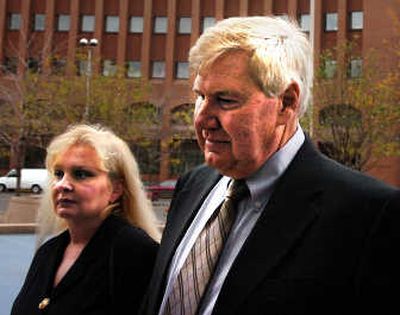Agents’ ruse argued at evidence hearing

Accused diploma mill operators Dixie and Steve Randock, of Colbert, told a federal judge they believed a hallway adjoining their leased Post Falls office suite was the designated private storage space for their companies.
Their testimony came at the end of a protracted evidence suppression hearing where a team of defense attorneys asked U.S. District Court Judge Lonny Suko to suppress 20,000 pages of documents stored in 11 cardboard boxes seized from the hallway by federal task force officers on March 29, 2005.
Defense attorneys Phillip “Dutch” Wetzel, Peter Schweda, Tim Trageser and Richard Wall argued during the eight-day hearing that the evidence should be tossed out because government agents committed “misconduct” by leaving a handwritten note – a ruse – instead of a federal search warrant with employees Heidi Lorham and Roberta Lynn Markistum. The two worked in Suite 8B in the Post Falls Professional Building, 601 W. Seltice Way.
Three months into “Operation Gold Seal,” the federal task force drew a bead on the Post Falls office suite, suspecting the companies registered there with the state of Idaho as “Kaching, Kaching Inc.” and “When Pigs Fly Inc.” were nothing more than fronts for an estimated 125 online universities selling phony degrees around the world.
The Randocks, the accused masterminds of the diploma mills, hastily moved their operation to Post Falls in August 2004 from an office at 14525 N. Newport Highway in Mead after a series of news stories about the operation were published in The Spokesman-Review, witnesses testified at the hearing that concluded Friday.
If the evidence from the Post Falls office hallway is suppressed by the judge, it would eliminate one significant building block in the yearlong federal investigation that ultimately led to indictments two years ago. The seizure of the cardboard boxes and other investigative work, including undercover purchases of college degrees and transcripts, led investigators to search several other locations in August 2005, including the Randocks’ home in Colbert, their “Home Boys” office building in Mead and the Post Falls office.
In October 2005, the Randocks were among eight defendants indicted in U.S. District Court in Spokane on charges of conspiracy to commit wire and mail fraud. The Randocks also were indicted on a charge of conspiring to launder more than $1 million they collected from selling bogus degrees.
Suppression could lead defense attorneys to seek dismissal of criminal charges against the defendants.
Dixie and Steve Randock separately took the witness stand Thursday and Friday, as their attorneys argued that investigators were guilty of “government misconduct” by not leaving a copy of a search warrant with the occupants of Suite 8B. After taking the boxes, an agent left behind a handwritten note saying the boxes were taken to the county landfill by an “angry tenant.”
That was merely a legal ruse used by investigators who didn’t want the Randocks to know they were the subjects of an ongoing federal investigation, prosecution witnesses testified.
Investigators complied with federal search and seizure rules by delivering their search warrant to the building owner who, prosecution witnesses testified, had control over the publicly accessible hallway where the boxes were stored. At the conclusion of the hearing, the judge said the legal issues before the court deal with the search warrant, issued by an Idaho judge to seize the boxes, and the subsequent conduct of officers who made the seizure. He scheduled closing arguments for Jan. 10 in Yakima, but they could occur earlier if his other scheduled cases settle and there is an opening in his court docket.